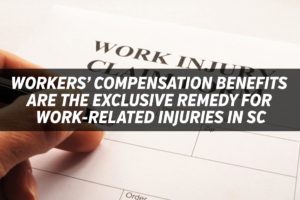Product Liability Claims in Greenville, South Carolina
Throughout the day, people interact with thousands of different products as part of their everyday lives. These include cars, kitchen appliances, televisions, tools, machinery, electronics, and many more products. For the most part, these products are safe. Sometimes, however, a product is a defective and dangerous, which can cause serious injuries to the consumers who use the product. When this happens, the consumer may have a claim for product liability.
A product liability claim is a legal cause of action that a party has as a result of injuries sustained from a defective or unreasonably dangerous product. The injured party may go after the manufacturer of the product to recover damages for the injuries caused by the product. There are three types of product liability claims: design defects, manufacturing defects, and marketing defects.
A design defect is one where the structure of the product is inherently dangerous or defective. An example is a car manufacturer designing brakes on a car that catch on fire when the car goes a certain speed. Conversely, a manufacturing defect is a defect that exists in one or only a few products and occurs in the manufacturing or assembly stage. An example might be a carmaker not properly installing the airbag in one’s car. Finally, a defect in marketing is the failure to warn consumers of latent or non-obvious dangers in using a product. An example is the failure to provide a warning that certain types of medication should not be used together.
Legal Liability for Product Liability Claims
In a product liability claim, any party in the chain of manufacturing can potentially be liable. The chain of manufacturing includes the manufacturer of the product, the party that assembles the product (if different than the manufacturer), the wholesale distributor of the product, and the retail seller of the product. There are several different legal theories under which a product liability claim may be brought against parties in the chain of manufacturing. These are strict liability, negligence, misrepresentation, and breach of warranty.
Under strict liability, the consumer must establish that an unreasonably dangerous or defective product caused the consumer injuries. The consumer need not establish that a party failed to use reasonable care in designing, manufacturing or distributing a product. South Carolina has a statute that establishes liability against the seller of a defective product, regardless if the seller exercised all possible care in the preparation and sale of the product. The difference under negligence theory is that the consumer must establish that a party in the chain of manufacturing breached its duty to exercise reasonable care.
In a breach of warranty theory, the fitness or quality of product is not the same as the seller promised. An example is when a seller gives a lifetime warranty on brake pads when in fact the brake pads wear down after a few months. Misrepresentation involves the manufacturer hiding material facts or making false statements regarding the quality or use of the product. These statements or omissions usually occur on a product’s advertising, labeling, product information, or other marketing materials. An example would be a manufacturer stating that a particular product is water resistant when in fact it is not. It is important to contact an experienced product liability attorney who can help you investigate your claim and provide advice on potential legal causes of action.
Contact a Greenville Product Liability Attorney
If you have been injured by a defective or dangerous product, David R. Price, Jr. is an experienced Greenville personal injury attorney who can help you recover damages for your personal injuries. Contact David R. Price, Jr. for a free initial consultation and case evaluation. You can call us at 864-271-2636.

David Price is a Personal Injury, Civil Litigation, Collections, and Criminal Defense Attorney who practices in Greenville, SC. He graduated from the University of Georgia School of Law, and has been practicing law for 12 years. David Price believes in helping those who have been injured. Learn more about his experience by clicking here.

